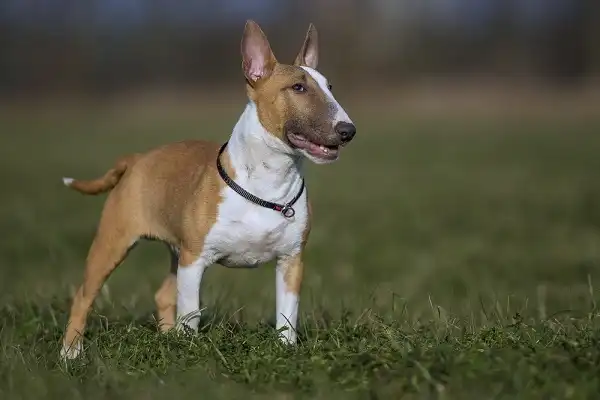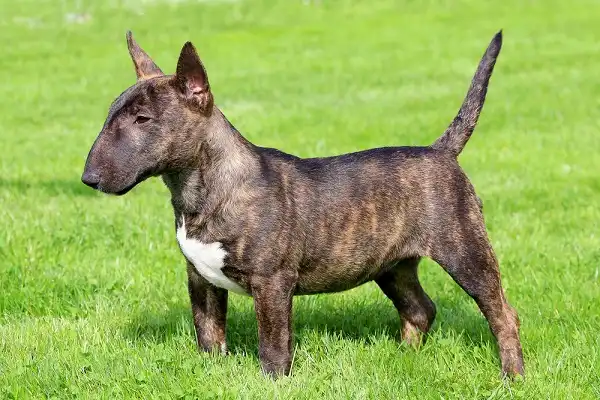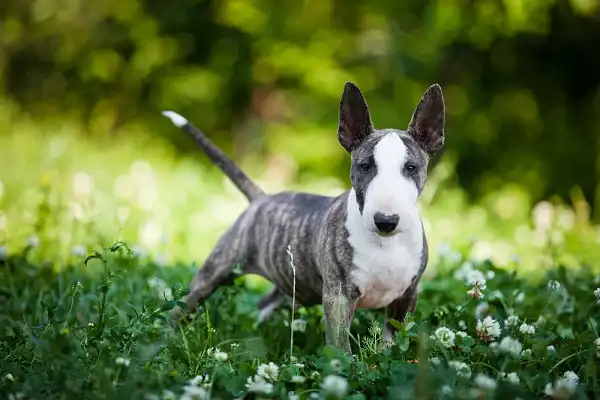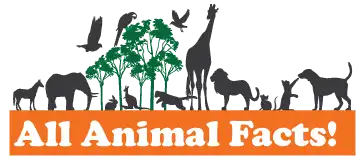Are you looking for a new canine companion that is both endearing and loyal? Then a Miniature Bull Terrier may be the perfect choice for you! This small but powerful breed has a rich history, with roots in England dating back to the 1800s. Known for its entertaining antics, this affectionate breed can quickly become an integral part of any household – bringing smiles and joy along with it. Learn more about this special creature right here as we explore its incredible attitude, unique history & characteristics, and all of the wonderful qualities that make each Miniature Bull Terrier one-of-a-kind.

Miniature Bull Terrier Description
The Miniature Bull Terrier, a scaled-down version of the larger Bull Terrier, immediately captures attention with its distinctive egg-shaped head and piercing, triangular eyes. These dogs are compact yet sturdy, with a muscular build that testifies to their innate strength despite their smaller stature. Their dense, short coat comes in a variety of colors and patterns, the most common ones being pure white, black brindle, red, fawn, and tricolor. Their energetic and vivacious nature is precisely connoted by their physical attributes. Miniature Bull Terriers are always on the go. Their hard, glossy coats are not just appealing but also significantly low maintenance, shedding minimally. Their full-sized, erect ears are always alert, representing their engaging and curious personality.
Miniature Bull Terrier Habitat
Miniature Bull Terriers are versatile canines that can adapt to various living conditions, whether it’s a spacious country home with a backyard or a compact city apartment. However, regardless of where they dwell, they require sufficient room to expend their energy. While they can live happily in an apartment, it’s crucial to provide them with regular exercise and mental stimulation to prevent boredom, which can lead to destructive behaviors. They’re social animals, so they should not be left alone for extended periods. Outdoor space is a bonus for Miniature Bull Terrier owners. These dogs thrive when they have a secure yard to explore and play in, but it’s important to ensure the area is well-fenced.
Miniature Bull Terriers are known for their determination and, when bored, might attempt to escape in search of adventure. They are also quite sensitive to extreme temperatures, so in hot climates, they should have access to cool, shaded areas, and in cold weather, they should be allowed to stay indoors as much as possible. Miniature Bull Terriers can comfortably cohabit with other pets if they are properly socialized from a young age. However, their strong-willed nature can sometimes lead to dominance issues, particularly with dogs of the same sex. Thus, careful introductions and monitoring are needed when integrating a Miniature Bull Terrier into a home with existing pets.
Miniature Bull Terrier Diet
A well-balanced diet is vital for a Miniature Bull Terrier’s overall health and well-being. As a breed, they have a tendency towards obesity, so it’s crucial to monitor their food intake and ensure it aligns with their age, size, and activity level. A diet rich in high-quality proteins, carbohydrates, and healthy fats is recommended, along with a suitable mix of vitamins and minerals to support their robust health. When it comes to feeding, Miniature Bull Terriers do well on commercial dry or canned food. However, some owners opt for a raw or home-cooked diet. Whichever feeding method you choose, ensure it is nutritionally balanced. Puppies typically require four meals a day, while adults can be fed twice daily. As with all dogs, fresh water should be available at all times. Treats are a wonderful way to reward your Miniature Bull Terrier, but they should be given in moderation to avoid weight gain. Avoid foods that are harmful to dogs, such as chocolate, grapes, onions, and excessive dairy products. Always consult with a veterinarian for dietary advice tailored to your Miniature Bull Terrier’s specific needs, especially if they have dietary sensitivities or health issues. Regular vet check-ups can help monitor your pet’s weight and adjust their diet as needed.

Miniature Bull Terrier Size
Miniature Bull Terriers are relatively small dogs, but they pack a lot of strength and energy into their compact frames. Despite their diminutive size, these dogs have a solid and muscular build, a testament to their origins as a breed developed for vermin control and pit fighting. They typically measure between 10 to 14 inches tall at the shoulder, making them a manageable size for a variety of lifestyles and living spaces. Their weight generally ranges from 18 to 28 pounds, positioning them in the small to medium category of dog sizes. Despite their smaller stature, they have a robust and sturdy physique. They carry a significant amount of muscle mass, which contributes to their overall strength and agility. Their size may vary slightly depending on their gender and individual genetic factors.
Miniature Bull Terrier Lifespan
Miniature Bull Terriers are known for their relatively long lifespan compared to other breeds, typically living between 10 to 14 years. However, with proper care, regular veterinary check-ups, and a balanced diet, they can live up to 16 years or more. Their lifespan is often determined by numerous factors, including genetics, diet, exercise, and overall health care. It is crucial to be aware of the common health issues that can affect this breed to ensure a long and healthy life. Miniature Bull Terriers are prone to certain genetic conditions such as heart diseases, kidney disorders, and deafness. Regular health screenings and prompt veterinary care can help in the early detection and treatment of these conditions, thereby potentially extending the dog’s lifespan.
Miniature Bull Terrier Behavior
Miniature Bull Terriers are renowned for their energetic and playful nature. These dogs are full of spirit, exuding a zest for life that’s truly contagious. They are known to be gregarious and friendly, often seeking out human companionship and attention. Despite their feisty origins, most Miniature Bull Terriers are not aggressive and are quite sociable. They are also known for their unique sense of humor and can often be found engaging in goofy antics to entertain their human family. While their playful demeanor is delightful, it’s important to note that Miniature Bull Terriers can be quite stubborn and independent. Training these dogs requires patience and consistency. They respond best to positive reinforcement techniques rather than harsh disciplinary actions.
Early socialization is crucial, teaching them to interact appropriately with other dogs and people. Despite their stubbornness, they crave interaction and often don’t fare well when left alone for extended periods. A bored or lonely Miniature Bull Terrier may resort to destructive behaviors such as chewing or digging. In terms of activity level, Miniature Bull Terriers are quite active and require regular exercise to keep them healthy and burn off excess energy. They enjoy activities such as walks, play sessions, and even agility training. However, they are also equally content to settle down and relax at home once their exercise needs have been met. It’s important to remember that a well-exercised dog is often a well-behaved dog.

Miniature Bull Terrier Speed
Due to their athletic and muscular build, Miniature Bull Terriers can reach impressive speeds. On average, they can run at speeds between 15 to 20 miles per hour (mph). Their speed can be attributed to their strong legs and compact, sturdy bodies. This speed capacity enables them to be agile chasers, reflecting their historical role as vermin controllers. However, individual speed can vary depending on factors such as the dog’s age, fitness level, and overall health. Younger, physically fit Miniature Bull Terriers may outrun older or less active ones. It’s crucial to ensure that the dog’s exercise regime is balanced, to prevent potential injuries from over-exertion and to maintain their optimal health. Despite their speed and energy, Miniature Bull Terriers are not endurance runners. They are more equipped for short, quick bursts of speed rather than long-distance running.
Miniature Bull Terrier Grooming
Miniature Bull Terriers have a short, dense coat that is relatively low-maintenance when it comes to grooming. The coat is typically glossy and lies flat against the skin, reducing the amount of shedding experienced. Regular brushing, about once a week, is generally sufficient to keep their coat looking clean and healthy. A rubber grooming mitt or a bristle brush would work best, removing dead hair and distributing the natural oils along the coat for a shiny, healthy appearance. Bathing a Miniature Bull Terrier should be done as needed, usually about once every few months unless the dog gets into something particularly dirty. Their short coat doesn’t tend to hold onto dirt and odors as much as longer or thicker coats do. When bathing, it’s important to use dog-approved shampoo to avoid damaging their skin or coat. Extra attention should be given to cleaning their ears, as they can be prone to infections. Aside from coat care, other aspects of grooming a Miniature Bull Terrier involve regular tooth brushing to maintain oral health, nail trimming every few weeks to prevent overgrowth and discomfort, and regular inspection of their skin for any signs of rashes, sores, or indications of parasites. Grooming can be a bonding experience between the dog and the owner and also serves as an opportunity to monitor their overall health.
Miniature Bull Terrier Hunting
Despite their small stature, Miniature Bull Terriers are known for their tenacity and prowess in hunting. Originating from the Bull Terrier breed, they were initially bred for controlling vermin populations. Their agility, speed, and muscular build made them excellent hunters, capable of quickly chasing and dispatching rats and other small pests. Even in the modern age, their instinct to chase and catch small animals remains strong, making them suitable for certain types of hunting activities. However, it’s important to note that the hunting instincts of a Miniature Bull Terrier can lead to problems if not properly managed. They may chase small animals, including other pets such as cats or rabbits, and can potentially cause harm if they catch them.
This is why it’s crucial for Miniature Bull Terrier owners to provide their dogs with appropriate training and socialization from a young age. This training should teach the dog to control its hunting instincts, especially in situations where they can lead to undesirable behavior. Despite these challenges, Miniature Bull Terriers can be excellent companions for hunting small game, provided their instincts are appropriately channeled. They’re quick, alert, and have a strong drive to chase and capture prey. Furthermore, their compact size allows them to navigate rough terrain more easily than larger dogs. However, their role in hunting should always be supervised by a responsible owner, ensuring the safety and well-being of the dog and surrounding wildlife.

Conclusion
In conclusion, Miniature Bull Terriers are a robust and energetic breed, equipped with a unique combination of speed, agility, and strength. Their low-maintenance grooming needs, coupled with their playful and affectionate nature, make them an attractive choice for many individuals and families. Despite their hunting instincts, with appropriate training and socialization, they can be great companions both in homes and outdoor adventures. Like all breeds, they demand care, attention, and love, but in return, they offer unwavering loyalty and heaps of enjoyment. Whether you’re seeking a spirited exercise partner or a loyal family pet, the Miniature Bull Terrier is a breed well worth considering.
Frequently Asked Question


